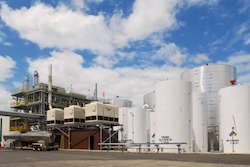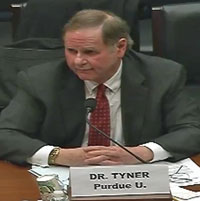During the Indianapolis Work Truck Show earlier this week, Alliance AutoGas conversion techs Stephen Holland and Stacey Snyder installed the Alliance fuel engineered conversion system on a Bi-Fuel 2016 3.5 Liter Ford F-150 V6 in a little more than an hour an a half, setting a record.

Stephen Holland, Blossman Services Inc. Equipment Application Engineer and Stacey Snyder, Blossman Services Equipment Conversion Tech
The propane fuel system features a single plug wiring connector with a 21-gallon underbody autogas tank with all wiring at proper specs. Everything is bracketed anddesigned to be installed without any drilling or fabrication. Alliance AutoGas says by deploying these features, labor times and conversion costs are significantly reduced.
Ed Hoffman, President of Blossman Services Inc., the equipment distributor for Alliance AutoGas said of the new feat and new propane autogas technology, “The live, record-setting conversion of the F-150 at the Work Truck Show proved that Alliance’s EPA and NFPA 58 compliant system can indeed be installed in far less than half the time of other products in the market without any permanent vehicle modifications. We are also confident in saying that that fleets can experience a positive ROI with a partial asset life when reduced conversion costs are coupled with low, stable fuel prices as well as our warranty that doubles the industry standard.”
Stuart Weidie, President of Alliance AutoGas, who spoke at the Live Conversion event, added, “We are proud that our innovative and elegant fuel system design was installed in far less time than we ever anticipated. Alliances’ state of the art technology coupled with a positive environmental impact, is a winner in all regards. It is a definitive message that our system will take the lead on reducing costs, and any barriers associated with fleet conversions going forward throughout North America.”
In early May of this year, the converted F-150 will embark on the Alliance AutoGas Clean Air Coast-to-Coast Ride, a 5,300 mile trip beginning in Kansas City, KS, and ending in Asheville, NC, on May 20.











